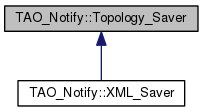|
TAO_CosNotification
2.0.8
|
|
TAO_CosNotification
2.0.8
|
An interface to be implemented by objects that save Topology. More...
#include <Topology_Saver.h>

Public Member Functions | |
| virtual | ~Topology_Saver () |
| The destructor. | |
| virtual bool | begin_object (CORBA::Long id, const ACE_CString &type, const NVPList &attrs, bool changed)=0 |
| Begin the storage of an object. | |
| virtual void | delete_child (CORBA::Long id, const ACE_CString &type) |
| Report deleted children to the saver. | |
| virtual void | end_object (CORBA::Long id, const ACE_CString &type)=0 |
| End the storage of an object. | |
| virtual void | close (void) |
| Close the saver. | |
An interface to be implemented by objects that save Topology.
A persistent topology store must provide an implemention this interface.
| TAO_Notify::Topology_Saver::~Topology_Saver | ( | ) | [virtual] |
The destructor.
| virtual bool TAO_Notify::Topology_Saver::begin_object | ( | CORBA::Long | id, |
| const ACE_CString & | type, | ||
| const NVPList & | attrs, | ||
| bool | changed | ||
| ) | [pure virtual] |
Begin the storage of an object.
Call this function with the type and ID of an object to be stored. This object may have children, and this will necessitate nested calls to begin_object. Design principle: Names should be descriptive enough to allow the objects' parent to create an instance of the desired class. This instance will be registered with the poa using the id. The instance itself should will load its own attributes. Example <proxy type="push_supplier" events="any" id="20"...> is not a good design because the name "proxy" is not descriptive enough. "<structured_proxy_push_supplier id="20"...> is better because this allows the parent to create the correct type of object without decoding attributes.
| id | numeric id for this object |
| type | string containing the unique type name for this class of objects |
| attrs | a collection of name/value attributes |
| changed | true if this object's attributes have changed. |
| void TAO_Notify::Topology_Saver::close | ( | void | ) | [virtual] |
Close the saver.
This is not pure virtual. The default implementation does nothing.
There should be a corresponding open, but the signature may vary based on the type of saver, so we can't include it in the interface.
Reimplemented in TAO_Notify::XML_Saver.
| virtual void TAO_Notify::Topology_Saver::delete_child | ( | CORBA::Long | id, |
| const ACE_CString & | type | ||
| ) | [inline, virtual] |
Report deleted children to the saver.
Use the ID and "type" as passed in to determine which child we should delete. A parent should call this function when one of its children is deleted.
| id | numeric id for the deleted child |
| type | the type name for the class of the deleted child. |
| virtual void TAO_Notify::Topology_Saver::end_object | ( | CORBA::Long | id, |
| const ACE_CString & | type | ||
| ) | [pure virtual] |
End the storage of an object.
This function should be called to end the scope of the current object and commit it to the persistent store.
 1.7.5.1
1.7.5.1